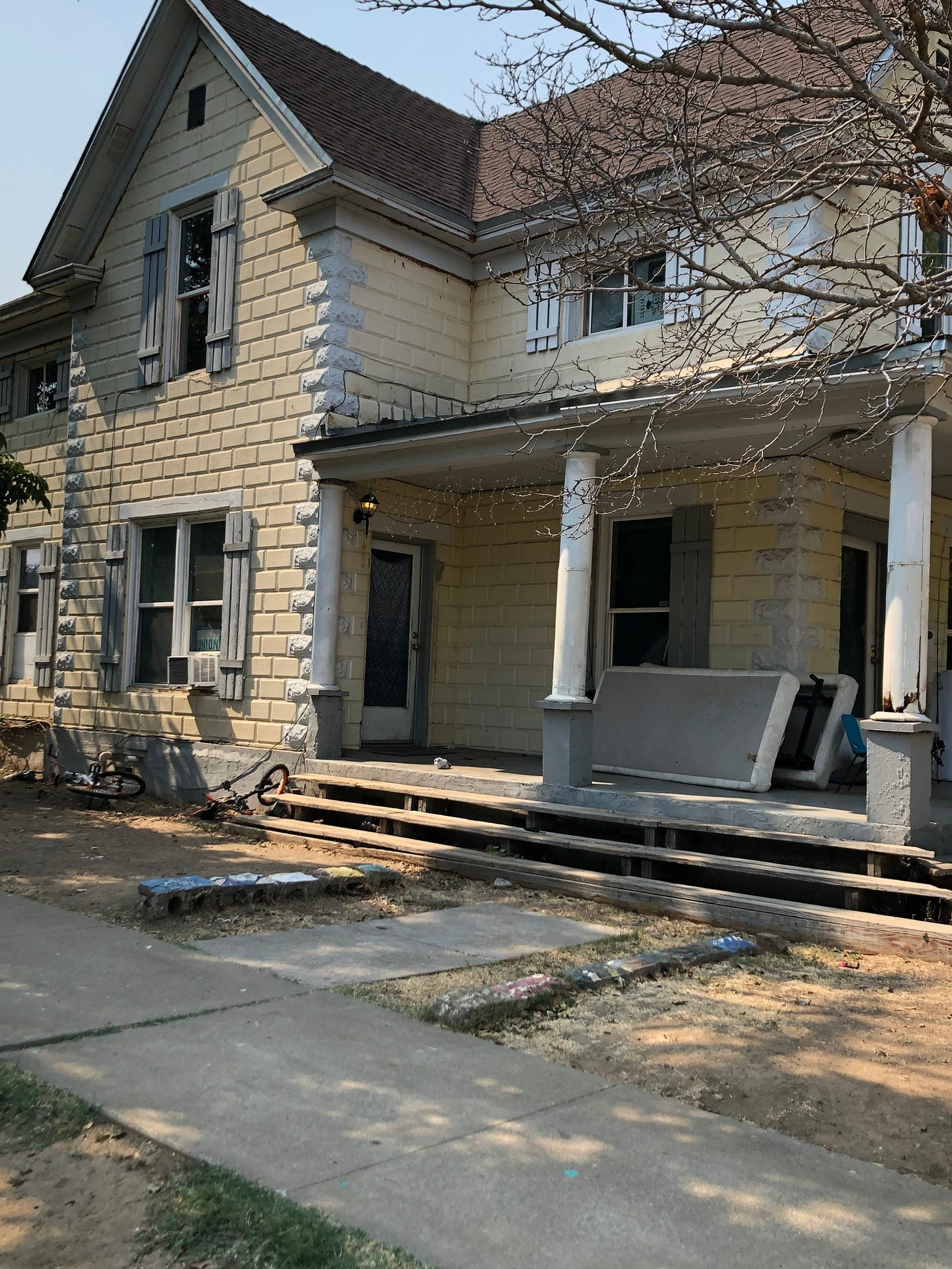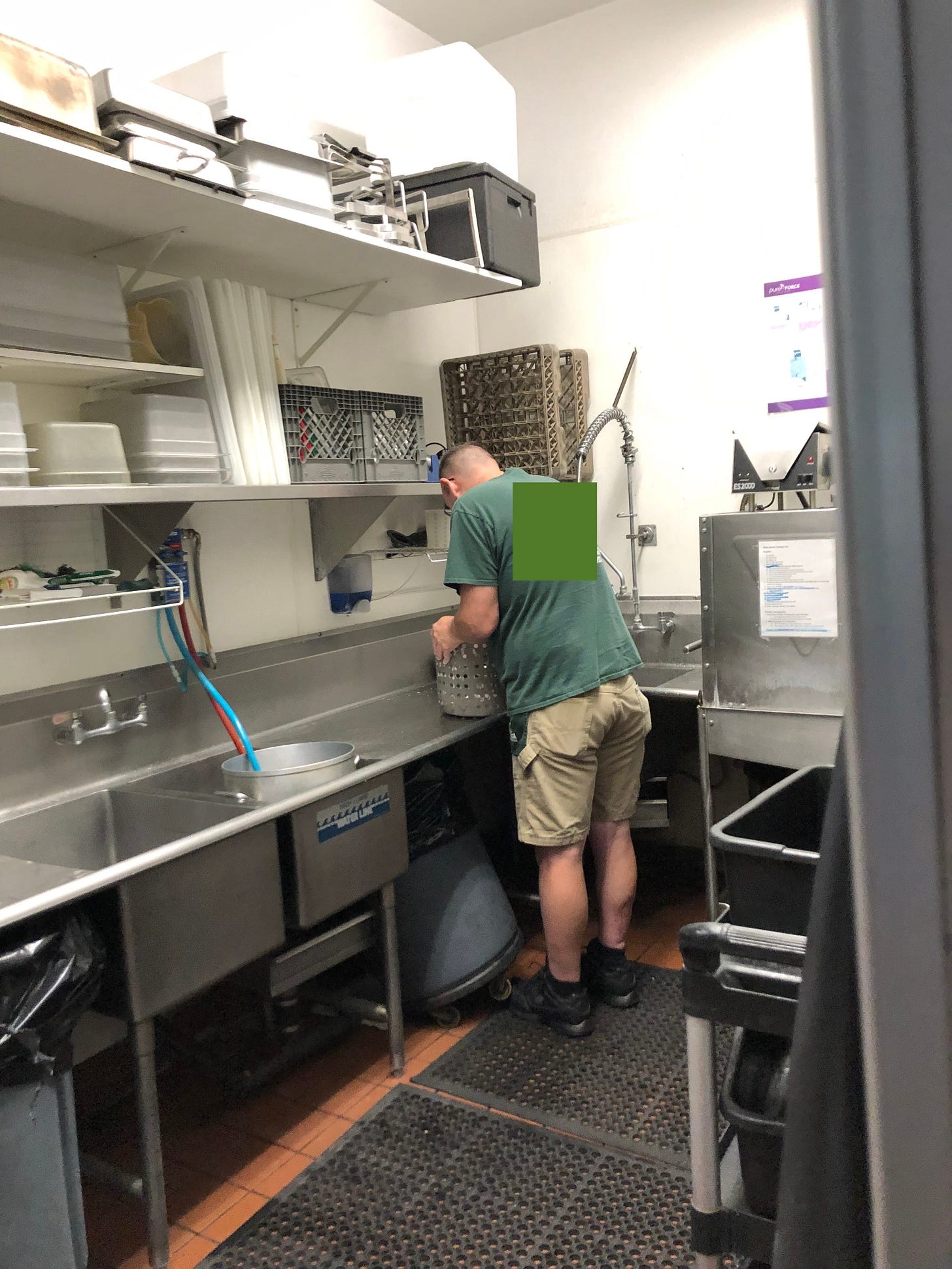The Happiness Lottery
Reflections on returning
I recently visited my home state of California. Most of my time was split between Redding/Red Bluff and San Jose.
This was supposed to be a relaxing vacation. But found that I couldn’t switch off completely. I took meetings with book publishers, spoke with people about potential job opportunities, and even turned my leisure into work by watching that dumb Netflix show “The Chair” and recording a podcast talking about it with Richard Hanania. It struck me that I don’t feel “relaxed” unless I’m working.
Many people would explain these tendencies by referring to inherited trait conscientiousness or something.
But that’s far from the sole factor. Back when I was in the military, I had zero compunction about taking it easy when I was on leave. I don’t even remember some of my vacations from my early twenties because I was black out drunk the entire time. I’d pound 12-15 beers a day for two weeks straight, gain 10 pounds, and burn it off during PT sessions (group runs, flutterkicks, burpees) when I returned to my duty station.
I attribute my shift in habits to two different factors.
One is a change in my social circle. I still have friends from my old life. But I have left many habits of that old life behind. My new social circle is largely comprised of strivers. People who work relentlessly. And, for better or worse, I have adapted to this.
But there’s a related factor. There’s this impending sense that I have to make up for lost time.
Back when I was a new recruit, I’d had a conversation with an older coworker.
“You ever think about going to college, maybe using the GI Bill?” I asked him.
“Nah that’s dumb,” he replied. “Think about it—I’d be so far behind my peers of the same age, it’s not worth it.”
I spotted holes in his logic—time was going to pass by anyway, so why not spend it doing something you find fulfilling? But at the time, I took his words at face value because, at the time, it was comforting to believe that my decision to avoid education was the right call.
I was a screwup in high school, invested essentially zero in myself when I was enlisted (I read a lot, but in hindsight I squandered a lot of those years), and feel that I have to run twice as fast to get to where I should have been given my age.
The reason I visited California was to see my family. I also hoped to jog some memories for my memoir.
I was raised in foster homes in Los Angeles. When I was adopted, I moved to Red Bluff. Then, the year before I graduated high school, my adoptive mother and her partner moved to San Jose. I remained in Red Bluff. It was the place I lived in the longest. Red Bluff the closest thing I have to a “hometown.”
The first thing I noticed when I returned was how rundown it looks now compared to my memories of it.
Thought I’d share a few pics.
This house was in better shape when I was a kid in the late 90s. Of the five houses I lived in Red Bluff, four looked worse (Well, the duplex looked pretty much the same).
My best friend lived here. I recall this being a “nice” house when I was a kid. My friend’s mom and stepdad usually had 5-7 foster kids living with them in the house. I suppose they were able to afford it because of the foster care payments they received from the state.
About a block away I saw cops talking to a guy who was soiled and obviously high out of his mind.
After she and my former adoptive father divorced, my adoptive mother met someone. She and her partner got this house. It wasn’t too bad—I had my own room and we had a small barbecue grill on that patio. There was a neighbor kid nearby who sold me cigarettes, weed, codeine, cough medicine (triple c’s), vicodin and other substances.
Stopped by the restaurant where I used to work. I had this guy’s job back in the day. I made six dollars and seventy-five cents an hour washing dishes and busing tables. The equipment here looks exactly the same as I remember it. Even the playlist in the restaurant was the same as when I worked there (I heard “Kryptonite” by 3 Doors Down; “Promiscuous” by Nelly Furtado, “How We Do” by The Game).
My second job in high school, bagging groceries. This was the “upscale” store in town. Back then, I was puzzled why anyone would pay twice as much for the same groceries they could get at the store down the street (where my family shopped). I learned that people with relatively higher incomes were willing to pay extra to shop in a store that made them feel posh. I noticed that the families of the kids who went to college shopped here. And the families of the kids who stayed in Red Bluff or languished in community college shopped at Grocery Outlet. After my first day at this job, I took a baseball bat and shattered the windshield of a car in a nearby lot.
Many people would look at my hometown and focus on the poverty. Of which there is plenty. But the meaning of the word has changed. As this article in The New Yorker puts it, “Today, taking advantage of the social safety net that the War on Poverty put in place—food stamps, Medicaid, and so on—is itself a sign of poverty.” It goes on to point out that in 1963, 20 percent of Americans lived in poverty. Today, the figure stands at 2.3 percent. In the past, being poor meant being hungry. Today, being poor means being on food stamps. In low-income neighborhoods, the problem is not primarily economic. I will never tire of highlighting this simple and profound finding:
Sociometric status (respect and admiration from peers) is more important for well-being than socioeconomic status.
In his powerful book Status Anxiety, Alain de Botton writes:
"Provided that it is not accompanied by humiliation, discomfort can be endured for long periods without complaint. For proof of this, we have only took look to the example of the many soldiers and explorers who have, over the centuries, willingly tolerated privations far exceeding those suffered by the poorest members of their societies, so long as they were sustained throughout their hardships by an awareness of esteem in which they were held by others."
There’s been a renewed discussion about the role luck plays in life outcomes. Much of this has been sparked by a new book titled The Genetic Lottery.
A key idea is that none of us chose our particular endowments. IQ, personality, and other variables that predict life outcomes. Thus, the author of the book and many others argue that we should favor redistributive policies to help those who got the short end of the stick.
I’m not opposed to financial assistance.
But the focus on economic redistribution overlooks something. There is more to life satisfaction than money.
The late behavioral economist and Nobel laureate Daniel Kahneman has points out:
“Income is an important determinant of people's satisfaction with their lives, but it is far less important than most people think. If everyone had the same income, the differences among people in life satisfaction would be reduced by less than 5%.”
Giving people a bunch of money isn’t suddenly going to improve their lives. But since highly-educated people primarily understand value in terms of dollars, it’s worth noting the following:
-In terms of the effect on happiness, having a friend you see regularly is worth $100,000 a year
-Being married is also worth $100,000
-Seeing your neighbor regularly is worth $60,000
-Other research suggests that income doesn’t have a lasting increase on happiness because people usually adapt to money. In contrast, marriage, family, and health have lasting increases on happiness and are immune to hedonic adaptation.
-Compared with not attending any religious service, attending a religious service once a week has the same effect on happiness as moving from the bottom to the top quartile of the income distribution
A poor person with a spouse, a close friend, a relationship with a neighbor, and who attends a religious service can achieve the same level of happiness as an affluent upper middle class person.
Some people would respond that money is a determinant of having a friend, a spouse, etc. There’s some truth to that. But bear in mind that the U.S. marriage rate during the Great Depression was far higher than it is today.
Today, poverty is lower than it’s ever been in the U.S. Yet happiness is declining.
A recent article in The Wall Street Journal reports, “Americans reported being less happy in 2018 than in 2008. Other wealthy countries saw similar decreases, including Belgium, Canada, Denmark, Japan...depression increased 50% between 1990-2017, with the highest increases in regions with the highest income.”
People have been making friends and getting married and forming social bonds for millennia, back when they lived on the edge of death. That’s how they survived in a dangerous world.
A recent study investigated the happiness of the Hadza (modern hunter-gatherers) compared with modern western people. The hunter-gatherers reported higher levels of happiness.
Hunter-gatherers are significantly happier than Americans, Austrians, Italians and citizens in other developed countries.
This was not moderated by sex—that is, women in hunter-gatherer communities were happier than women in developed countries.
The idea that material circumstances are the primary determinant of our subjective emotional states and the organization of our social lives is a weirdo Marxian theory. But it somehow became the conventional wisdom among educated people.
Some people argue that the redistribution of economic resources mitigates the unfair distribution of genetic endowments. You or I might be smarter, or taller, or more attractive than average. And these traits are economically lucrative. But we didn’t earn those traits (and the associated financial benefits), so, the logic goes, we should share our money with those who aren’t as fortunate as us.
But this hinges on the belief that economic resources are the main causal factor for happiness.
As I pointed out in the above findings, our relationships are at least as important to life satisfaction as money. Yet our elites are reluctant to promote marriage, friendship, social bonds, neighborliness, etc. The non-material factors that give rise to a rich and fulfilling life.
Somehow we’ve become reluctant to publicly endorse any sort of value that lies outside of economics. Governments pay people to take vaccines. Cities are paying residents not to shoot people.
Leaders have become reluctant to appeal to higher ideals or principles. The belief seems to be that all that matters is economic incentives.
In a 2019 New York Times op-ed, two Nobel laureates share research findings indicating that people overestimate the strength of economic incentives. The authors report that “status, dignity, social connections” are more powerful drivers of behavior.
So why the focus on economic redistribution? Many reasons, some noble. But one is that promoting friendship and marriage doesn’t hurt one’s enemies. Malicious envy is the strongest predictor of support for coercive redistribution. Rich people want to see people richer than themselves suffer. If the richest 90-99th percentile of people discovered that marriage among the poor would inflict pain on the richest 1 percent, then that 9 percent would be the strongest supporters of matrimony.
Anyway, you and I might know something about what it means to live a satisfying life. But we didn’t “earn” whatever traits we have that led us to this understanding (and the associated happiness). So, the logic goes, we should share our knowledge with those less fortunate than ourselves.
We can give money to people to help them out. But we can also promote wise choices and strong norms to help them out. The fortunate among us can share our wealth, sure. But we might also share our values—steps we have taken to live fulfilling lives.
I wrote this in the summer of 2021.







As usual, this is so thoughtful and insightful - you would be a wonderful coach for JD Vance, who grew up enduring many of the same circumstances (albeit not the same level of family disruption) and, IMO, would benefit from learning to express the lessons to be learned in this manner - meaning deeply personal but relatable and understandable, especially for those of us who also came from humble backgrounds and now now live among the “elites”.
Rob
Always enjoy your posts.
This one recalls this famous advice . . .
“Stop storing up for yourselves treasures on the earth, where moth and rust consume and where thieves break in and steal. Rather, store up for yourselves treasures in heaven, where neither moth nor rust consumes, and where thieves do not break in and steal. For where your treasure is, there your heart will be also..’’
Material treasure isn’t dependable. Always passes.
However . . .
“The lamp of the body is the eye. If, then, your eye is focused, your whole body will be bright. But if your eye is envious, your whole body will be dark. If the light that is in you is really darkness, how great that darkness is!’’
Envy wants to destroy what others have. Makes the ‘whole body’ (entire life) dark, miserable.
How great current ‘darkness’ really is!
Thanks
Clay